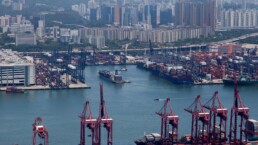‘’For so long, Africa has been playing catch-up with the rest of the world. Yet in actual sense, we are endowed with more resources than those that are more prosperous than us. Look at China, India, Korea, United States and Europe. There is nothing special about them but how they have consolidated their efforts for growth. This is the time that Africa has been waiting for.”- Alexis Nsengumuremyi, Chairperson of Rwanda Manufacturers Association and head of PSF Chamber of Industries.
On Wednesday, March 21st 2018, Heads of State and Government convened at the 10th Extraordinary Summit of the African Union (AU) in Kigali, Rwanda. The outcome of this meeting translated into something historic for the African continent – the adoption and signing of the agreement establishing the African Continental Free Trade Area (AfCFTA), by 44 Member States of the African Union. Notably, the Declaration launching the AfCFTA was also signed by 43 AU Members. By creating a single continental market, the AfCFTA will create a market to cover over 1.2 billion people, with a combined gross domestic product (GDP) of about $3.4 trillion, from Morocco all the way to South Africa.
Africa, having been identified by the United Nations in 2017 as the continent that will account for a significant chunk of the World’s Population by 2050, this trade deal could not have been signed at a better time. The AfCFTA means, an increase in opportunities for Africa, but with these are valid concerns raised by some stakeholders.
For a country like Nigeria, with a population of about 190 million, it came as a shock to the AU community and Africa, when His Excellency, President Muhammadu Buhari failed to sign the trade agreement on behalf of the country. Nigeria, and a host of other countries that include Sierra Leone, Guinea Bissau, Burundi and Eritrea signed neither the Agreement nor the Declaration in Kigali.
Commenting on the AfCFTA, this is what President Buhari had to say,
‘’We are widening and deepening domestic consultations on the AfCFTA, to ensure that all concerns are respectfully addressed. Any African Free Trade Agreement must fairly and equitably represent the interest of Nigeria, and indeed, her African brothers and sisters. Nigeria fully recognizes and appreciates the efforts of the African Union Commission so far, regarding the implementation of a sustainable Continental Free Trade Agreement (CFTA) for Africa. We also acknowledge that our continental aspirations must complement our national interests’’.
I had the opportunity to be a part of one of these consultations recently with stakeholders in Nigeria, as one of the representatives from the Presidential Council on the Ease of Doing Business. A lot was said about the benefits of the AfCFTA and what Nigeria and Africa could stand to gain once countries begin the ratification of the Agreement. Members of the private sector still had concerns, including, what would happen to infant industries once this borderless market is established? Is Nigeria ready to be a part of an agreement of this magnitude?
One of the stakeholders present in the room, who is a key player in the Nigerian rice industry mentioned that the battle between the country and rice smugglers from Benin Republic is still on-going, and he was worried that introducing the AfCFTA before such issues are, addressed would affect the nation’s plans of being self-sufficient in rice production. He feared that products such as brown rice (parboiled rice) which is not consumed by Benin Republic will be legally imported into Benin, packaged and exported back into Nigeria thereby not benefitting local business and economy. Another stakeholder addressed the infrastructural challenges, stating that Nigerian manufacturers do not have adequate infrastructure in place to be competitive in a wider market. The Small and Medium Scale Enterprises (SMEs) similarly wanted to know how to best prepare themselves and what assurances are available for them to protect their businesses. The President of the largest trade union in Nigeria, the Nigerian Labour Congress (NLC) also raised his concerns, as to why the Nigerian Government will be thinking of opening its seaports, airports and other business to what he termed ‘’unbridled foreign interference’’. To him, the AfCFTA will have crippling effects on local businesses and attendant effects on jobs.
With the above genuine concerns, what exactly does the AfCFTA hold for Nigeria’s economic growth and prosperity? The expected benefits for Nigeria once the nation signs the AfCFTA and ratifies the agreement are definitely worth considering.
Some of these benefits include:
- Increased consumer market for Nigerian producers of goods and services of c. 1.2 billion
- Boosting job creation through increased intra-African trade
- A dispute settlement mechanism to allow for amicable and transparent means to resolve intra-African trade related disputes
- Rules-based trade governance in intra-African trade to ensure fair trade and legal right to use trade remedies to safeguard the Nigerian economy from dumping and injurious trade practices
- A platform for Small and Medium Scale Enterprises (SMEs) to integrate into the regional economy and accelerate trade and economic empowerment
- Perception change of Nigeria from protectionist and defensive, to open, modernist and integrationist
- Improve Nigeria’s Ease of Doing Business Rankings by the World Bank via the Federal Government’s Ease of Doing Business Reforms Initiative and Trade Facilitation.
With the above benefits, it is key to understand that Africa must trade more with itself. Nigeria, as the most populous African nation with the largest economy needs to recognize the opportunity to take the leadership role in the largest trade Agreement to date. It is worth noting that the AfCFTA supports two initiatives being championed by the Nigerian Government, the Economic Recovery and Growth Plan (ERGP), as well as the Ease of Doing Business Reforms, through the Presidential Enabling Business Environment Council (PEBEC), chaired by His Excellency, the Vice President, Prof. Yemi Osinbajo.
The consultations with stakeholders and the organized private sector is not a once-off event, it needs to be on-going and consistent. The Nigerian government should be ready to take all necessary steps towards signing the AfCFTA as well as the Declaration sooner rather than later.
Kwame Nkrumah, in his speech to 31 African Heads of State in Addis Ababa, Ethiopia, over 55 years ago said:
“No independent African state today by itself has a chance to follow an independent course of economic development, and many of us who have tried to do this have been almost ruined or have had to return to the fold of the former colonial rulers. This position will not change unless we have a unified policy working at the continental level’’.
This statement proves the urgent necessity of the AfCFTA, and its ratification by the requisite number of Member States before the end of 2018.
The government should further be prepared to approach the implementation of this agreement through a multi-disciplinary agenda, protecting the infant industries as stated above, while at the same time providing the opportunity for the more mature industries in the country to globally compete within the African market.
The views expressed in this article are those of the author alone and not the Future Africa Forum.
The views expressed in this article are those of the author and do not necessarily reflect the views of Future Africa Forum. Future Africa Forum is a pan-African policy think-tank and policy advisory consultancy headquartered in Nairobi, Kenya.



